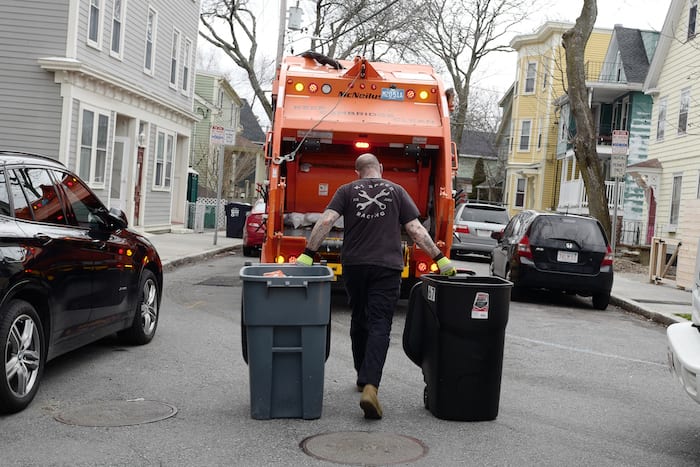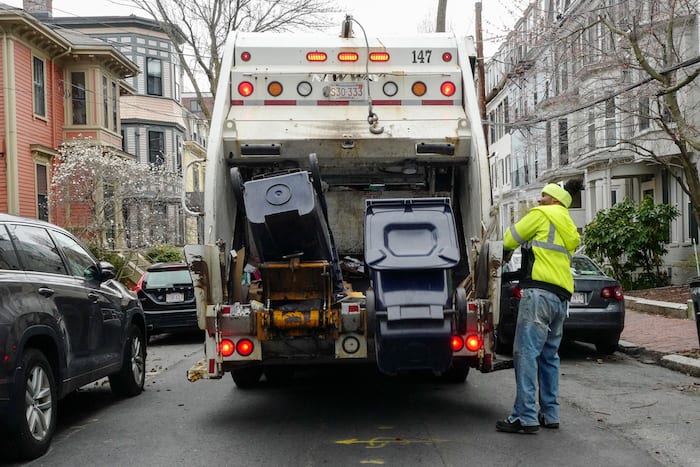
PHOTOS BY LUIS EDGARDO COTTO | TRANSLATION BY ADRIENNE EVANS
“If we don’t clean, under what conditions will the doctors be able to work?”
In Italy and Spain, where citizens are forced to quarantine inside their homes to prevent the spread of COVID-19, people go out to the balconies and windows to applaud medical personnel, those whose work threatens their lives, and the people who are most affected by the virus.
In the US, as the White House focuses on blaming everything from China to former President Barack Obama, fewer people seem to recognize that if someone does not clean and disinfect the corridors, waiting rooms, operating rooms, and other hospital spaces, healthcare personnel would fare far worse in the battle against coronavirus.
Wendy Melendez Dominican, friendly and hardworking, has been cleaning the Tufts Medical Center in Boston for 10 years. She says she has seen everything—from rivers of blood, to syringes that she has to collect with no more protection than thin rubber gloves and a broom. These needles are left in the unsupervised bathrooms of the hospital, where addicts can hide to get a fix.
Now, Wendy says, “I have never been so worried. I continue to work with great fear. We are taking risks, but as long as there are healthcare staff working, we are an essential part of the whole. Because if we don’t clean, under what conditions will the doctors be able to work?”
“We take risks to safeguard others,” she continues. “We are the support system for the staff. But if they risk their own health, we risk twice as much. Because we clean and collect the waste, and in a pandemic situation like this, this is a job that is much more dangerous and problematic.”
Wendy says that she has been on the verge of passing out upon discovering some messes she’s been assigned to clean, like an occasion when a physician cut a patient’s vein while trying to collect a skin culture. The room was covered in blood. She mainly works cleaning the consultation rooms of the infectious disease building, where “patients of all kinds arrive, and there always ends up being something contagious.”
Wendy continues to wear the gloves she “normally” wears, only now she puts on masks more often, since she understands “that there may be a higher risk.”
“If I have to wear 15 gloves at once, I put them on—I protect myself,” she says, expressing regret that among her colleagues, there are some people at riskier ages, such as a man who cleans on the night shift who is “more than 70 years and has said that he doesn’t want to retire.”
These days, despite fears about coronavirus, Wendy continues to work under stressful conditions for two reasons: out of solidarity and social responsibility (“the doctors must work in areas that are clean and disinfected”); and for pure survival (“no one has yet said that you don’t have to pay the rent, that you don’t have to pay the bills.”).
Wendy is a member of the Local 32BJ branch of the Service Employees International Union (SEIU). She explains that, thanks to the union, they now earn more ($20 an hour) than before and have some benefits, but says it is still a job where one lives paycheck to paycheck. “An hour worked, that’s a paid hour. If we do not work, we aren’t paid. This is the main reason we must come to work. We cannot afford to stop working.”
She has a message for others: “We are trying to take care of people, but we need people to do their part, for people stay at home. We need them to not expose themselves and put us further at risk, because we do it out of obligation and necessity. Because you don’t potentially spread the virus yourself to one person. You spread it to a lot of people, to your family, and to the people you ride with on the bus, on the train.”
Local 32BJ represents about 14,000 janitors and about 6,000 security employees in Massachusetts. They mostly work in office buildings and hospitals, and at Harvard and MIT. As of the time of this reporting, five members of Local 32BJ had tested positive for coronavirus.
The union is fighting so that those infected continue collecting for hours they are losing from work, SEIU vice-president Roxana Rivera says in a telephone interview. She explains that union members who work full-time have benefits such as health insurance for themselves and their families, as well as paid sick and vacation days. But if they are fired, they no longer receive benefits. And now, many of the cleaning and security employees who work at the universities are losing their jobs. MIT has promised to pay them 30 days, while Harvard will do the same, but that’s only for those it hires directly. For the other union members, subcontracted through outside vendors, it depends on what those companies decide regarding jobs and benefits.
The union is fighting so that all those dismissed due to this pandemic situation receive some compensation. SEIU constantly monitors cases, speaking with the families of those affected, and staying in communication with the companies employing the workers to make sure safety protocols are followed.
Of the five cases of union members who are suffering from coronavirus, Rivera said one of them is in serious condition.
“It is a public health crisis,” Rivera says. “If they have to send people home, then pay them. We are asking universities and buildings to also pay the workers who are subcontracted.”
The union is also trying to inform its members as much as possible by giving them brochures about how to protect themselves against COVID-19, encouraging them to watch out for themselves, communicating with the companies who hire the subcontractor workers, and talking to the business leaders of each of the 2,000 workspaces where their members work.
Rivera notes that her constituents, the majority of whom are African-American and immigrants, now work with high levels of fear and anxiety. She says that universities and other businesses where layoffs are now taking place recognize that now, more than ever, these workers provide an invaluable service to society.
“Don’t use workers only when you need them and then kick them out,” Rivera adds. “They need to pay contractors to pay workers right now. These men and women are the anonymous heroes of the coronavirus pandemic and are among those who least can afford to lose their wages and benefits during this crisis.”

Another anonymous hero is Kevin, a young man who is employed as a trash collector on the streets of Cambridge. He appears happy and energetic in a job he started on January 6 after being on a waiting list for 10 years. Kevin handles garbage cans as he fills the truck with trash, and doesn’t seem overly concerned about the coronavirus. On the other hand, he acknowledges that they have a lot more work now than when he started this job just under three months ago.
On the one hand, there is much more residential garbage, since many people do not leave their homes and consume everything there. On the other hand, the workforce has been reduced to minimize contact and risk between colleagues from three workers to two per truck. If there’s any silver lining, it’s that with the drastic reduction in traffic, they are saving a lot of time on the way from home to work and back.
“There is much more trash, much more shit,” he says, “smiling without stopping to move between trash cans and jumping up and down from the truck. “But if we stop working for a single day, everything rots and the rats will take over the city.”

